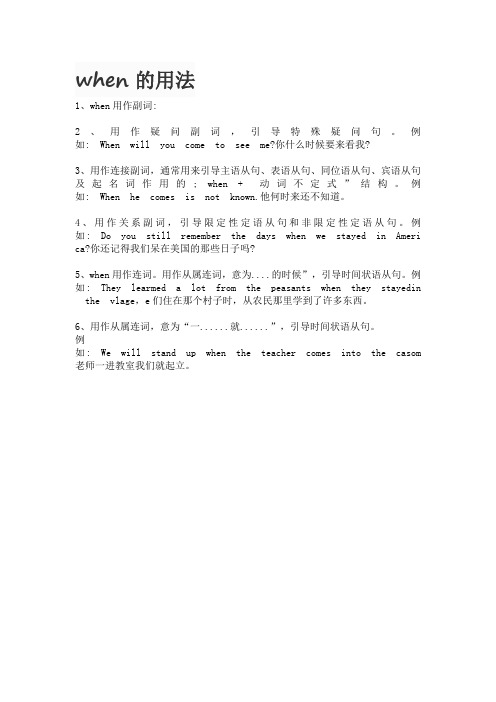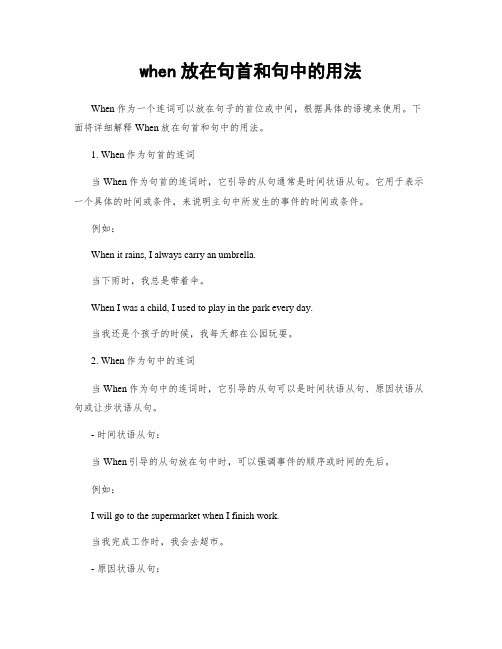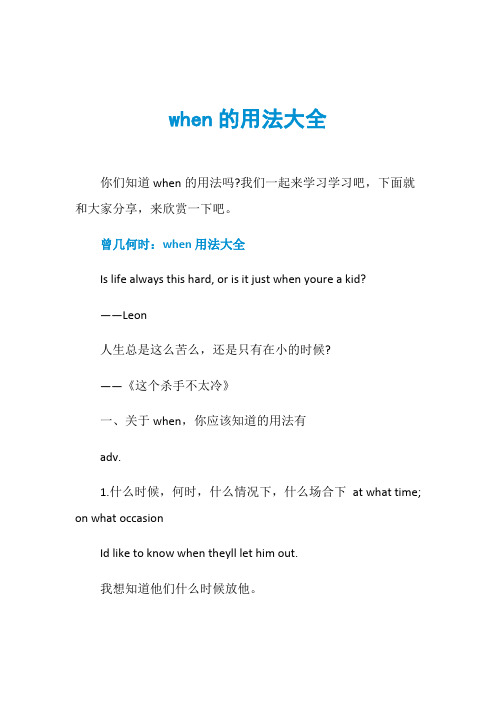连词when的用法
when的用法

when的用法
1、when用作副词:
2、用作疑问副词,引导特殊疑问句。
例如: When will you come to see me?你什么时候要来看我?
3、用作连接副词,通常用来引导主语从句、表语从句、同位语从句、宾语从句及起名词作用的; when + 动词不定式”结构。
例如: When he comes is not known.他何时来还不知道。
4、用作关系副词,引导限定性定语从句和非限定性定语从句。
例如: Do you still remember the days when we stayed in Ameri ca?你还记得我们呆在美国的那些日子吗?
5、when用作连词。
用作从属连词,意为....的时候”,引导时间状语从句。
例如: They learmed a lot from the peasants when they stayedin the vlage,e们住在那个村子时,从农民那里学到了许多东西。
6、用作从属连词,意为“一......就......”,引导时间状语从句。
例
如: We will stand up when the teacher comes into the casom 老师一进教室我们就起立。
when放在句首和句中的用法

when放在句首和句中的用法When作为一个连词可以放在句子的首位或中间,根据具体的语境来使用。
下面将详细解释When放在句首和句中的用法。
1. When作为句首的连词当When作为句首的连词时,它引导的从句通常是时间状语从句。
它用于表示一个具体的时间或条件,来说明主句中所发生的事件的时间或条件。
例如:When it rains, I always carry an umbrella.当下雨时,我总是带着伞。
When I was a child, I used to play in the park every day.当我还是个孩子的时候,我每天都在公园玩耍。
2. When作为句中的连词当When作为句中的连词时,它引导的从句可以是时间状语从句、原因状语从句或让步状语从句。
- 时间状语从句:当When引导的从句放在句中时,可以强调事件的顺序或时间的先后。
例如:I will go to the supermarket when I finish work.当我完成工作时,我会去超市。
- 原因状语从句:当When引导的从句放在句中时,可以表示一个原因或理由。
例如:I couldn't sleep when I drank too much coffee.当我喝了太多咖啡时,我就无法入睡。
- 让步状语从句:当When引导的从句放在句中时,可以表示尽管某种情况存在,但结果仍然发生。
例如:Even when it's cold outside, I still enjoy going for a walk.即使外面很冷,我仍然喜欢去散步。
总结:无论When放在句首还是句中,它都用于引导从句。
当When放在句首时,引导时间状语从句;而当When放在句中时,可以引导时间状语从句、原因状语从句或让步状语从句。
根据具体的语境,我们可以准确地使用When来描述事件的时间、条件、原因或让步。
when if的用法

when if的用法
"When" 和 "if" 都是英语中的条件连词,但它们的用法有一些区别。
"When" 的用法:
1. "When" 可以用于表示一个事件发生的时间,例如 "When did you arrive?"(你什么时候到达的?)
2. "When" 也可以用于描述条件,但通常用于描述更具体的条件,例如"When the sun is shining, I like to go to the beach."(当太阳照耀时,我喜欢去海滩。
)
"If" 的用法:
1. "If" 通常用于表示一个条件,并且这个条件可能导致某种结果,例如 "If you want to succeed, you must work hard."(如果你想成功,你必须努力工作。
)
2. "If" 可以用于描述更一般的条件,例如 "If there is a will, there is a way."(有志者事竟成。
)
总结:
"When" 和 "if" 都可以用于描述条件,但 "When" 更侧重于描述时间或情境,而 "If" 更侧重于描述条件和结果。
在具体使用时,可以根据语境选择合适的连词。
when 用法

when 用法"when" 是一个常用的副词和连词,用于引导一个时间、条件或原因从句,或用于询问时间、条件或原因。
以下是"when" 的一些详细用法:1. 引导时间从句:- "I will call you when I arrive home."(当我到家时,我会给你打电话。
)- "He was sleeping when the phone rang."(电话响时,他正在睡觉。
)2. 引导条件从句:- "I will go to the park when it stops raining."(当雨停下来时,我会去公园。
)- "She will start studying when she finishes her dinner."(当她吃完晚饭时,她会开始学习。
)3. 引导原因从句:- "He was late for the meeting when his car broke down."(当他的车抛锚时,他迟到了会议。
)- "She couldn't sleep when she had a lot on her mind."(当她有很多事情在心头时,她无法入睡。
)4. 用作连词表示同时发生的两个动作:- "I was reading a book when the doorbell rang."(当门铃响时,我正在看书。
)- "She was cooking dinner when her friend called."(当她的朋友打电话时,她正在做晚饭。
)5. 引导疑问句询问时间、条件或原因:- "When did you arrive?"(你什么时候到的?)- "When will they start the project?"(他们什么时候开始这个项目?)- "When can we meet again?"(我们什么时候可以再次见面?)总的来说,"when" 用于引导时间、条件和原因从句,用于描述同时发生的动作,或用于询问时间、条件和原因。
when的用法小结

when 用法小结不管是在口语中,还是在书面语中,when是一个十分活跃的词,该词主要用作连词和副词,但是在意义方面其用法比较复杂。
一、作副词1. 作疑问副词,用于构成特殊疑问句,意为“什么时候;何时”。
When will they come back?他们什么时间回来?When can you finish the work? 你什么时间能完成这项工作?2. 作连接副词,引导名词性从句,或与不定式连用,意为“什么时候”。
Can you tell me when the bank opens?你能告诉我银行什么时候开门吗?When she'll be back depends on the weather. 她何时回来取决于天气。
Have you decided when to go sightseeing?你们已经决定什么时候去郊游了吗?3. 作关系副词,引导定语从句。
The main school holidays are from mid-December till early February,when the days are long and warm. 学校的主要假期是从12 月中旬到2 月初,这段时间里白天长而且很温暖。
Do you remember the time when the three of us went on a holiday in Guilin?你还记得我们三个人在桂林度假的那段时光吗?二、作从属连词,引导状语从句。
1. 表示时间,意为“当……时;在……的时候”。
When you see him, please say hello to him. 见到他时,代我问他好。
When I reached the station,the train had left. 当我到达火车站时,火车已经开走了。
2. 表示条件,相当于if。
How can I get a job when I can't even read or write?如果我连读和写都不会,我怎么能找到工作呢?3. 表示对比,相当于whereas, while, since, 意为“既然;然而”。
when表示当什么时候的用法

when表示当什么时候的用法
"when" 是一个英语连词,用于引导时间状语从句,表示"当......的时候"。
它通常用来描述某个事件发生的时间,也可以用来表示条件或假设。
例如:
1. I will call you when I arrive at the airport.(我到机场时会给你打电话。
)
2. She will go to bed when she finishes her homework.(她做完作业后会去睡觉。
)
3. We can go to the movies when it stops raining.(当雨停了我们可以去看电影。
)
4. He knows the answer when the teacher asks the question.(当老师问问题时他知道答案。
)
在这些例子中,"when" 引导了一个时间状语从句,用来描述主句中的事件发生的时间或条件。
"when" 还可以用于引导条件状语从句,表示"如果......的话"。
例如:
5. I will call you if I have any news.(如果我有任何消息,我会给你打电话。
)
6. She will come to the party if she feels better.(如果她感觉好一些,她会来参加聚会。
)
总之,"when" 是一个常用的连词,用于引导时间状语从
句和条件状语从句,表示时间或条件。
when的用法

when作连词的用法一、作为从属连词,引导状语从句1、表示时间,意为“当……时;在……的时候;一……就”。
(1) When you see him, please say hello to him. 见到他时,代我问他好。
(2) When I reached the station, the train had left. 当我到达火车站时,火车已经开走了。
(3) We had hardly fallen asleep when the bell rang. 我们刚刚入睡,铃声就响了起来。
2、表示原因,相当于in view of the fact that; considering that既然;考虑到。
How can I help them to understand when they won't listen to me?既然他们不愿听我的,我又怎么能帮助他们弄明白呢?3、表示条件,相当于if。
How can I get a job when I can't even read or write?如果我连读和写都不会,我怎么能找到工作呢?二、作为并列连词,引导并列句。
3、表示前面的叙述所没有提到过的信息。
相当于after which; and just then (implying suddenness)意为:一…就;正在这时(1) He was still smiling when the door opened and his wife came in.他正笑着的时候,门突然开了,他妻子走了进来。
(2) We were about to start when it began to rain. 我们刚要出发就开始下雨了。
(3) He was on the point of leaving when someone knocked at the door.他刚要走就有人敲门。
when的用法大全

when的用法大全你们知道when的用法吗?我们一起来学习学习吧,下面就和大家分享,来欣赏一下吧。
曾几何时:when用法大全Is life always this hard, or is it just when youre a kid?——Leon人生总是这么苦么,还是只有在小的时候?——《这个杀手不太冷》一、关于when,你应该知道的用法有adv.1.什么时候,何时,什么情况下,什么场合下at what time; on what occasionId like to know when theyll let him out.我想知道他们什么时候放他。
2.(用语时间的表达方式之后)在那时,其时used after an expression of time to mean at which or on whichThe Queens last visit was in May, when she opened the new hospital.女王上次来访是在五月份,她那时主持了这座医院的落成典礼.3.其时,当时,当场at which time; on which occasionconj.1.在……时候,当……时,在……期间at or during the time thatHere the local were always barbered at this hour on this day.原来本地人老是在这一天这个时候这个地方理发。
2.在……之后afterWhen I mingled with other families I distinctly discerned how peculiarly fortunate my lot was.在我接触到别的一些家庭之后,我清楚地体会到自己可谓得天独厚的天之骄子。
3.在任何……时候at any time that; wheneverYou can save the game at any time when youre at your bunk.任何时候你都可以在你的床位储存你的游戏。
- 1、下载文档前请自行甄别文档内容的完整性,平台不提供额外的编辑、内容补充、找答案等附加服务。
- 2、"仅部分预览"的文档,不可在线预览部分如存在完整性等问题,可反馈申请退款(可完整预览的文档不适用该条件!)。
- 3、如文档侵犯您的权益,请联系客服反馈,我们会尽快为您处理(人工客服工作时间:9:00-18:30)。
一、作为副词,它有以下的用法:
1. 作为疑问副词,引导特殊疑问句,意为“什么时候;何时”。
(1 )When will they come back?
(2 )What time will they come back?
回答when 引导的从句,不一定指出具体的时间点。
如回答句( 1 )可用tomorrow,next month 等。
而回答what time 引导的问句,则必须说出具全的时间点,如at two o'clock,at five past ten 等。
2. 作连接副词,引导名词性从句或不定式,意为“什么时候”。
从句使用陈述句语序,时态根据实际情况而定。
(1 )I'd like to know when they will come. 我想知道他们什么时候来。
(when 引导宾语从句)
(2 )Can you tell me when the bank opens?你能告诉我银行什么时候开门吗?(when 引导宾语从句)
(3 )When she'll be back depends much on the weather. 她何时回来在很大程度上取决于天气。
(when 引导主语从句)
(4 )Have you decided when to go sightseeing?你们已经决定什么时候去郊游了吗?(when 引导不定式结构)
3. 作疑问代词,常和介词since,till,up to 等连用,意为“什么时候”。
如:(1 )Since when have they had the house?他们从什么时候起有这幢房子的?(2 )Till when is the library open?图书馆开放到几点呢?
4. 作关系副词,引导限制性定语从句和非限制性定语从句。
(1 )The days are gone forever when the Chinese people were looked down upon. 中国人民被人轻视的日子一去不复返了。
(2 )The main school holidays are from mid-December till early February,when the days are long and warm. 学校的主要假期是从12 月中旬到2 月初,这段时间里白天长而且很温暖。
(3 )Considering (the time)when these paintings were done,they are in excellent condition. 考虑到这些油画的创作时期,它们保存的状况是极好的。
(4 )Do you remember (the time)when the three of us went on a picnic?你还记得我们三个人去野餐的那段时光吗?
A. 在定语从句中,that 在某些条件下可用来代替when ,这时其先行词通常是time,
day,moment,year 等。
(1 )His mother died on the evening that he was born. 他母亲死于他出生的那晚。
(2 )I stay at home on the days that I am not busy. 在我不忙的时候,我就呆在家里。
B. 在某些含有“时间”的名词词组后面,由于该名词不表示时间,或整个名词词组已用
作连词,所以不用when 引导。
如:the moment,the instant,the minute,the second 等等,意为“一……就……”,引导时间状语从句。
(1 )The first time I went to China,I visited Beijing. 我第一次来中国就游览了北京。
(2 )I thought her nice and honest the first time I met her. 我第一次见到她时就认为她很诚实。
(3 )The instant I saw him I knew he was my brother. 我一看到他就知道他是我兄弟。
二、作为从属连词,引导状语从句,表示多种语法意义:
1. 表示时间,意为“当……时;在……的时候”。
A. 在时间、条件等状语从句里,用一般现在时表示将来时;当需要表达将来完成的意义时,必须使用现在完成时来代替。
(1 )When you see him,please say hello to him. 见到他时,代我问他好。
( 2 )When you have finished your experiment,please tidy the lab and put everything back in the cupboards. 当你们做完实验后,请把实验室整理好并把物品放回柜子中。
B. 表示过去发生的事情,在when 引导的时间状语从句的主从复合句中,动作发生在先的用过去完成时,在后的用过去时。
(1 )When I was in Japan,I bought some beautiful pearls. 我在日本时,买了一些漂亮的珍珠。
(2 )When I reached the station,the train had left. 当我到达火车站时,火车已经开走了。
2. 表示前面的叙述所没有提到过的信息。
它总是对所描述的事件予以引人注目的强调,意为“这时;突然”;当位于句末的分句具有引种用法时,大致有以下三种情况:
A. when 分句前面的分句使用过去进行时。
(1 )He was still smiling when the door opened and his wife came in. 他正笑着的时候,门突然开了,他妻子走了进来。
(2 )I was thinking of this when I heard my name called. 我正想着这件事时,突然听到有人叫我的名字。
B. when 分句前面的分句使用was (were)about to,was (were)on the point 等。
(1 )We were about to start when it began to rain. 我们刚要出发就开始下雨了。
(2 )He was on the point of leaving when someone knocked at the door. 他刚要走就有人敲门。
C. when 分句之前的分句用过去完成时,其中sb had hardly / scarcely /barely … when 已成为固定词组。
(1 )We had hardly fallen asleep when the bell rang. 我们刚刚入睡,铃声就响了起来。
(2 )He had scarcely arrived when he had to leave again. 他刚刚到达就又要离开了。
3. 表示条件,相当于if ,引导条件状语从句。
如:How can I get a job when I can't even read or write?如果我连读和写都不会,我怎么能找到工作呢?
4. 表示对比,主要有以下两种情况:
A. 相当于whereas,while,since,意为“既然;然而”。
(1 )How can I help them to understand when they won't listen to me?既然他们不愿听我的,我又怎么能帮助他们弄明白呢?
(2 )They have only three copies when we need five. 他们只有三本,而我们却需要五本。
B. when 从句中使用虚拟语气,意为“本来……却……”。
(1 )She paid when she could have entered free. 本来可以免费入场,而她却付了款。
(2 )She stopped trying when she might have succeeded next time. 她本来下次有可能获得成功,但她却不再尝试了。
(3 )They were gossiping,when they should have been working. 他们本该工作,却在那里说别人的闲话。
5. 由when 等引导的状语从句,如果主语与主句的主语一致或是it ,谓语动词又含be 动词时,主语和be 动词常常被省略,就变成“ when + V-ing/ V-ed/ adj/ 介词词组”的结构。
(1 )When in Rome,do as Romans do. 入乡随俗。
(2 )When (we are )young,we are full of hope. 年轻时,我们大家总是充满希望。
(3 )Don't reach sideways when standing on a ladder. 站在梯子上时,不要侧着身子去够东西。
